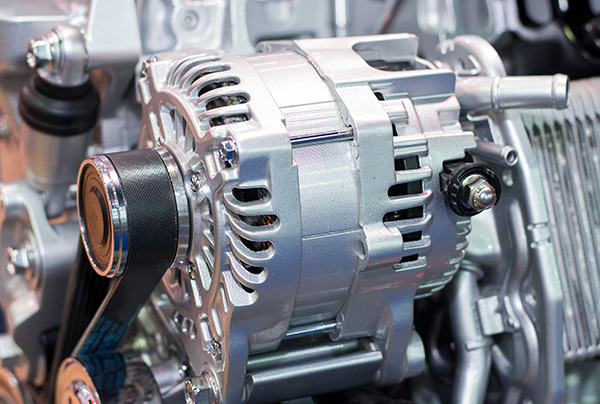
Your vehicle’s alternator plays a crucial role in keeping everything powered and running smoothly. It charges the battery while the engine is running and supplies electricity to systems such as the headlights, radio, climate control, and onboard computers. When the alternator starts to fail, you might experience a variety of electrical issues, strange noises, or warning lights. The sooner you recognize the signs, the better chance you have of avoiding unexpected breakdowns.
What the Alternator Does
While the battery gets your engine started, it’s the alternator that keeps the power flowing afterward. Once the engine is running, the alternator takes over by converting mechanical energy into electrical energy through a belt-driven system. It keeps the battery charged and supplies energy to all of your car’s electronics.
If the alternator fails, your vehicle may run for a short time using just battery power, but eventually the battery will drain, causing the engine to shut off or systems to malfunction.
Signs of a Weak or Failing Alternator
Knowing what to watch for can save you from getting stranded. Alternator issues often develop gradually and may begin with small, intermittent symptoms before becoming more serious. One of the most noticeable signs is dim or flickering headlights. Since the alternator powers your lights, any inconsistency in brightness, especially when idling or revving the engine, may point to electrical trouble.
Another early warning sign is dashboard warning lights. Most cars have a battery-shaped warning light that may illuminate if the alternator isn’t charging properly. Even though it looks like a battery icon, it often signals an alternator-related issue. Some vehicles may also display “ALT” or “GEN” lights.
Strange electrical behavior is also a common symptom. You might notice your radio cutting out, power windows moving slowly, or the air conditioning functioning erratically. In newer vehicles, touchscreen systems or driver-assist features may behave unpredictably.
Odd Noises From the Engine Bay
A failing alternator can sometimes make a grinding or whining noise. These sounds may come from worn bearings inside the alternator or from a loose or slipping serpentine belt, which connects the alternator to the engine’s crankshaft pulley. If the belt isn’t tight or starts to wear, it can slip and reduce the alternator’s output.
Any time you hear unusual engine bay noises, especially those that change with RPM, it’s worth having the charging system inspected.
Dead Battery or Frequent Jump-Starts
While it’s common to assume a dead battery means the battery itself has failed, it could just as easily be caused by a weak alternator. If your car won’t start and you need frequent jump-starts, the alternator may not be replenishing the battery’s charge.
If the problem is left unchecked, the battery will continue to drain until it’s completely discharged. Replacing the battery without addressing the real issue won’t solve the problem for long.
Trouble Starting or Stalling
The alternator helps power the ignition system, which controls engine timing and spark. When the alternator fails, your engine might crank slowly, hesitate to start, or stall shortly after starting. These symptoms often go hand in hand with dashboard warning lights or erratic electrical behavior.
In some cases, the engine may run fine at higher RPMs but cut out during idle or low speeds. That’s because less alternator output is available when the engine is turning more slowly.
What to Do If You Suspect Alternator Trouble
If you suspect an alternator issue, don’t ignore it. Electrical problems often escalate quickly and can affect multiple systems at once. Continuing to drive with a failing alternator risks damaging the battery, stranding you unexpectedly, or even causing voltage surges that damage sensitive electronics.
Technicians use diagnostic equipment to measure charging system performance and voltage output. They can determine if the alternator, battery, or another component is responsible. In many cases, a failing alternator can be rebuilt or replaced before it causes further damage.
Keep Your Charging System Reliable With Help From Pete’s in San Francisco, CA
At Pete’s in San Francisco, CA, we understand how frustrating electrical problems can be. If you’ve noticed dim lights, dashboard warnings, or frequent battery issues, our experienced technicians can perform a full charging system inspection to identify the problem quickly and accurately.
We’ll test your alternator, battery, and related components to ensure everything is functioning correctly. Whether you need a belt adjustment, an alternator replacement, or just peace of mind, we’re here to help you stay powered up and on the road.
Schedule your diagnostic inspection at Pete’s today and avoid being left in the dark by a failing alternator.